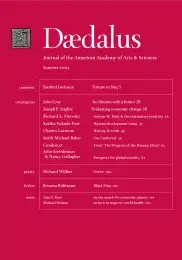History & truth
History, according to Schopenhauer, teaches but a single lesson: eadem, sed aliter–the same things happen again and again, only differently. “Once one has read Herodotus, one has studied enough history, philosophically speaking.”1
If, like Schopenhauer, we survey human affairs from afar, assuming the stance of a neutral spectator, suspending all our own interests and commitments, we will have to agree. At so great a remove, what else will we see but, as he said, countless variations on the same old theme of people pursuing dreams they never achieve, or find disappointing when they do?
Consider the cardinal cases where history is held to do more than repeat itself, where it supposedly shows direction and progress. Theories that scientists in one age endorse meet nonetheless with refutation in the next. Technological innovations aimed at easing man’s estate go on to create new needs and burdens. Modern democracies, despite their promise, do not end the domination of the many by the few. Progress is bound to seem an illusion if we look at life from the outside, abstracting from our own convictions about nature and the human good. For then we cannot make out the extent to which our predecessors, despite their defeats, were still on the right track. All that we will perceive is their inevitable failure to accomplish the ends that they set themselves. History will serve only to remind us that man’s reach always exceeds his grasp.
Yet ordinarily we think quite differently than Schopenhauer did about the past, and about modern times in particular. In reflecting on the course of the last five hundred years we usually conclude that great strides have been made in understanding nature and in creating a more just society. Patterns of scientific and moral progress come into view, once we lean on established conceptions of nature and scientific method, of individual rights and human needs. Classical mechanics constituted an advance over Aristotelian physics, we then say, because it came nearer to the truth about matter, force, and motion, and perceived . . .
